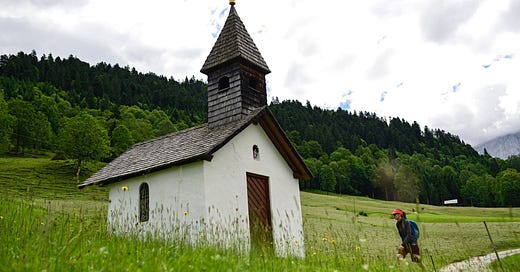The Problem of Communion: The Temptation of the Faithful
Are we willing to be faithful alone?
I’ve recently begun wrestling with issues of communion between Christians and churches. And for some years, I’ve been studying and wrestling with the practical outworkings of eschatology in history and for us. This post will venture to wrestle with both in a small but not trivial way. Hold on.
My opinion is that the faithful church militant (i. e. the church on Earth) will become very small by the time Christ returns. Scripture might not explicitly teach this but it nonetheless points to this trying future in three main ways.
First, there is a pattern of God waiting until the faithful are few before he judges. We see this with the Flood and with Sodom. I think this pattern will repeat before Christ returns to judge the quick and the dead.
Second, Jesus did ask, “When the Son of Man comes, will He find faith on the earth?” (Luke 18:8) Although he let his question hang in the air and in Scripture, it should give us pause.
I wrote more about these first two indicators at the end of Advent last year.
The Narrowing of God’s Mercy
No, this will not be a very Christmasy post. It is still Advent for one more day, and so I will administer some medicine accordingly.
Third, Scripture teaches there will be a great apostasy, a great falling away from the faith. (2 Thess. 2:3; 1 Timothy 4:1) We might already be in the Great Apostasy, but I do not presume to know that and think we should all be careful to avoid presumption in eschatology. But there is no question there’s a lot of apostasy going on and has been for at least a century and more. In many cities and regions that were once bastions of The Faith, the faithful are already few. The same could be said of too many denominations.
So again, it is my opinion that the faithful church on Earth will become very small before Christ returns. Many I respect disagree. If you think I am missing something that either confirms or contradicts my opinion, feel free to comment.
If faithful Christians do become few and far between, that presents a quandary and a temptation for the faithful who remain. If faithful churches are hard to come by, the temptation will be to give up and give in and be in communion with unfaithful, even apostate churches.
This is already a quandary for many Christians and has been at times for me. So as a start to looking at what I call the Problem of Communion, I presented several models of dealing with this problem.
The Problem of Communion
Communion among Christians is part of The Faith, not a pious footnote and not an option. The Apostles’ Creed commits the Christian to say, “I believe in the . . . holy Catholic Church [and] the Communion of Saints.” And in case one misses that “Church” is singular, the Nicene Creed says, “I believe
I think we can rule out two models. “Unity for the sake of unity” in disregard of adherence to even the basics of the Faith is ruled out by Scripture and the Fathers. At the other extreme, requiring “agreement on everything” does not give the scriptural mandate for unity enough weight. And many of us are already in situations where requiring agreement on just about everything means you get to be the Pope of your apartment cathedral. Requiring faithfulness or at least agreement on the basics is one thing. Requiring agreement on everything cuts one off from too many faithful. That is never a good way to go and will become even less tenable if the faithful become fewer.
But rightly rejecting those two extremes still leaves difficult choices and the temptation to compromise too much on faithfulness. How much is too much? The authority of Scripture and the Creeds are non-negotiables but how much else is?
I consider the first Seven Ecumenical Councils to be authoritative (as my icon collection reveals), but if I were to require such conviction for full communion, I would have to become Roman or Greek to find a church in my city. Seeing issues with both that are weightier than icons, I doubt I could do either. Many hold strongly to the importance of a male-only presbyterate, and I’ve slowly come to that view. But require that and you have pretty much ruled out the largest orthodox Anglican denomination in America, the Anglican Church in North America (ACNA). If “wokeness” is a communion breaker (as it pretty much is for me), then good luck finding a sizable denomination where that has not been a problem.
So I am loath to insist on boundaries of communion beyond the basics. But communion among the faithful surely should require more than a desire for unity and lip service to Scripture and the Creeds. How often clergy recite the Creeds with their lips then deny them with the same lips and minds and willful deeds! Yes, I should not get started on that.
At the same time, insist on much more than the very basics of The Faith and soon you may find yourself in communion with yourself and a likeminded brother you know online who lives a hundred miles away and not many others. You think I’m exaggerating? It is already difficult for many to find a suitable church within driving distance.
All this is to present that when the faithful become few and far between and finding a good church is difficult, the temptation grows to be in communion with unfaithfulness and even apostasy. That no matter where one draws the boundaries of what is required faithfulness. The temptation is great for many Christian individuals and churches already.
I have no easy answers as to how to deal with this temptation. But if we are so tempted, we shall not be the first. Noah and Lot and Rahab were surrounded by unfaithfulness but instead of entering a devilish communion with evil, they remained faithful even though it was just them and their willing households. And God delivered them from the just judgement of the evil around them. I’m convinced the times before The End will be similar with God’s voice calling out, “Come out of her, my people, that ye be not partakers of her sins, and that ye receive not of her plagues.” (Rev. 18:4 KJ)
If God calls us to be faithful and seemingly alone like Noah, Lot and Rahab, so be it. More likely for most at this time, God may call us to bypass larger more convenient churches to join smaller more faithful churches. If so, so be it. May the Lord help us to be faithful no matter what, no matter if we or our spiritual descendants are the last faithful on Earth.





I’ve been wrestling with as well, Mark. I’m in a Continuing Anglican Church (not ACNA), and of course, as an Anglo-Catholic Rome is always at least on the outskirts of our consciousness. I wrestle with the “smallness” of our church—not that we should despise the day of small things, but how we seem isolated, self-defeating, and ever fracturing more (the history of the Continuum is rife with splits, with someone always running of to be Charismatic Anglican Pentecostal Archbishop and Poobah of America in their basement). There has to be both safeguarding the good deposit entrusted to us, but also recognizing we are called to communion with other believers. I don’t have an answer, I just don’t always like where we are.
Mark,
I am a relatively new reader/followers of yours. Not even sure how or where I found you. So, I don't know you very well yet through your writing, but I'm getting there. I think we share a lot in common.
I live in the Madison, WI area, having moved here from the Chicago area when I retired. I moved here to help start a new ACNA church which is now called Christ Church Madison (christchurchmadison.com), in our 7th year. We were sent by Church of the Resurrection in Wheaton, IL. Our bishop, Stewart Ruch III, leads the Diocese of the Upper Midwest, and is a firm believer in church planting. I think we were #12 or #13 in that vision. Christ Church Madison has grown to be the largest ACNA church in Wisconsin. We average 230 for Sunday Worship.
The ACNA allows each Bishop and diocese to decide if it will ordain women priests, deacons, etc. In our case, we ordain men as priests only, and allow women and men to be ordained as deacons. I am comfortable with this, and believe it to be biblical.
Because of the history of the ACNA, and how it came to be, we have this odd arrangement where there is quite a bit of diversity from diocese to diocese. It has some healthy aspects, but also some not so good. I personally hope and pray that the ACNA refines and defines these issues over time so that the entire Province is on the same, biblical page. We have a new Archbishop who I am waiting to see how he will lead.
At Christ Church Madison, and the other churches in our diocese, we welcome all believers to participate in the Eucharist. The caveat is that the participant be baptized and committed to following Jesus. We provide other options if that is not the case. I believe this is a healthy, good way to manage the issue. It maintains proper exclusivity, while extending fellowship to believers of other traditions.
Our community is healthy, thriving, joyful, generous, and growing in the Lord. I am privileged to be a part of it. It saddens me to hear of others experience, as you described it, where no real gospel-preaching church can be found within a practical distance. That would be really tough for me also.
Please consider visiting and worshipping with us if you are ever in the Madison area!